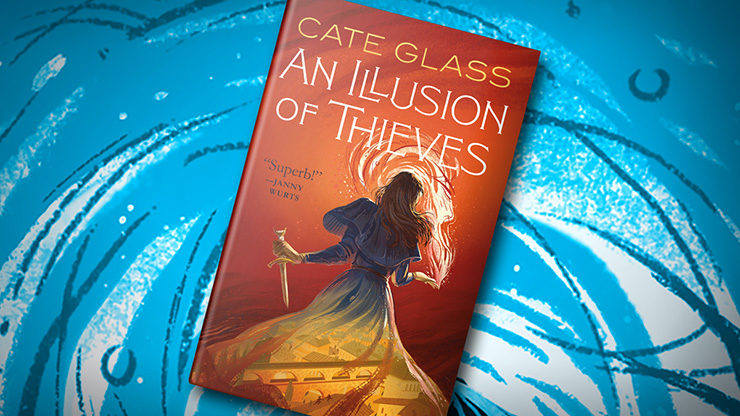Heists. What are they good for? Quite a lot, actually which is why they are a plot structure that translates well into science fiction and fantasy works. Heists are great for showcasing team dynamics, action beats, unique character skills, and the sudden, difficult choices that arise when a carefully planned heist meets some unexpected threats. If anything, it’s only surprising that more authors do not attempt to use the form.
A heist revolving around the use of magic in a world where such magic is forbidden—hunted down and extirpated, in fact—is the set piece that is the tentpole of Cate Glass’ An Illusion of Thieves.
The novel takes its time setting up the world, the magic, and the relationships that make a heist work. The world building here runs very much to the taste and theme of an alternate Renaissance Italy. There are some very interesting wrinkles and developments, not only because of the existence of forbidden magic, but the discussions around why that magic exists, why it is bad, and the theorized metaphysics of her universe. But all of this takes a back seat to characterization. Romy starts off in an position of oblique power and status as the mistress of il Padroné, the head of the city state of Cantagna. Sure, she’s estranged from her family, but it is a good life. The Padroné does not even seem to know that she has a very secret magical gift, one that she dares not use except in extreme circumstances.
Romy’s younger, hot-headed brother Neri is more careless, and the covert use of his magical gift for theft makes it seem that his father is the only logical culprit. This threatens the future of his father, and his family as a whole. Romy’s plea to the Padroné for clemency for her father comes at the cost of her own position and status. The rest of her family banished from the city; Romy is banished from the court, and forced to be guarantor for her brother. Together, they are forced into a hardscrabble existence in the poor area of the city, and Glass convincingly shows the stressful effects of this change in Romy’s circumstances. The novel spends copious time in building the siblings’ often fraught relationship, as Romy attempts to forge a life for herself and her brother. Pulling heists isn’t even on her mind, she’s focused on simple survival.
The rest of the crew falls into Romy’s orbit in relatively typical fashion. Placidio, a dissolute swordsman and duelist initially hired to teach Neri the art of fighting, turns out to have secret magic of his own tied to his fighting prowess. Dumond, a silversmith whose practical skills wind up becoming important to the heist itself, has a magical gift that again is very different than the others. His introduction, by circumstance and accident, is a harrowing sequence that shows just how seriously the city state takes the use of magic and the efforts they are willing to go to in order to pursue a presumed magician. Magic, even as it is hunted down, feared and fought against, takes a variety of forms, and it is extremely dangerous to practice any of them openly.
Buy the Book


An Illusion of Thieves
A quartet of thieves, all magicians, performing a heist, really has a much more diverse and interesting application in this novel than what that cover copy might otherwise suggest. Practicing their talents in utter secret, Glass’ magicians are not robed figures pouring over books or conduits of magical energy, but are more ordinary people with extraordinary gifts who have those secret powers as only part of who they are and what they do. Romy’s power to cloud minds is not the same as her brother’s transport ability, which contrasts with Dumond’s door making ability—and none of those match Placidio’s ability to recover from injuries. One interesting and well-explored consequence of a world where magic is forbidden is that the characters do not understand the limits of their own abilities, and there is a realistically grounded “trial and error” approach to their magical talents.
And so we come to the heist itself. The reasons why our crew decide to pull their con runs strongly to the altruistic, and also as a response to unexpected circumstances. Romy is given the hottest of hot potatoes, an ancient piece of sculpture that her former lover has wanted for political purposes for years. When a political rival reveals that he has it, and it is subsequently stolen and deposited into Romy’s hands, the political implications are heavy. Unless carefully managed, the Padroné’s honor and political position are at risk, and with it, the eventual future of Cantagna as well. Now, if the team were to profit from the heist in the process, that would be no bad thing, but it is not their primary motivation. Romy and her team set out to fool both sides as to what precisely has happened and to set things right. Juggling action beats, reverses, changes in plan, and tense interactions between a disguised Romy and her former lover, these very well written sequences are the heart of the book, what all of the scaffolding of the previous chapters have set the reader up to appreciate.
The reward for a well done job is another job, and the novel sets the crew up for future missions, someone of them, perhaps, covertly for the Padroné himself. I appreciate that the author very carefully has set up things so as not to hit the reset button and to keep the tension between the former lovers. I look forward to more crunchy character interaction, as well as more heists and further development of the intriguing world Glass is building here.
An Illusion of Thieves is available from Tor Books.
Note: Cate Glass is an open pseudonym of fantasy author Carol Berg.
An ex-pat New Yorker living in Minnesota, Paul Weimer has been reading sci-fi and fantasy for over 30 years. An avid and enthusiastic amateur photographer, blogger and podcaster, Paul primarily contributes to the Skiffy and Fanty Show as blogger and podcaster, and the SFF Audio podcast. If you’ve spent any time reading about SFF online, you’ve probably read one of his blog comments or tweets (he’s @PrinceJvstin).










